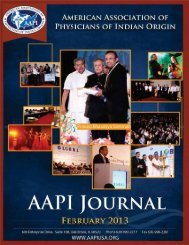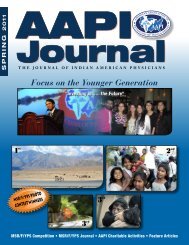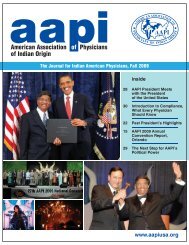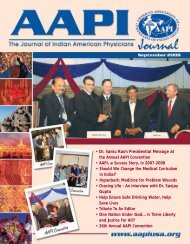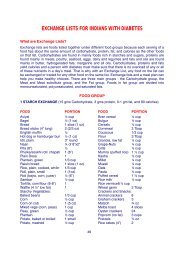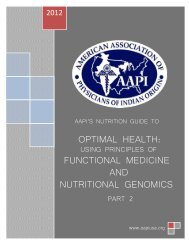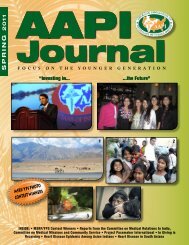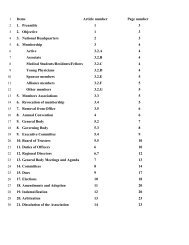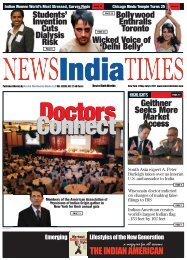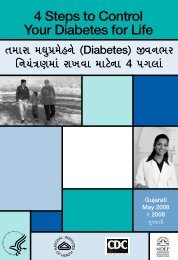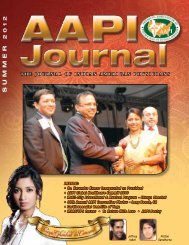Great Equalization: Is MBBS From India Equal To M.D. In U.S.A?
Great Equalization: Is MBBS From India Equal To M.D. In U.S.A?
Great Equalization: Is MBBS From India Equal To M.D. In U.S.A?
Create successful ePaper yourself
Turn your PDF publications into a flip-book with our unique Google optimized e-Paper software.
AAPI Journal • March 2009<br />
FEATURE<br />
Crisis!<br />
by Dr. M. P. Ravindra Nathan<br />
M. P. Ravindra Nathan, M.D.<br />
Brooksville, Florida<br />
“Come to the office right away”,<br />
Becky, my nurse, interrupted my<br />
ICU rounds. “Sally fell in the<br />
examining room. I think she has a<br />
fractured hip,” her words exploded<br />
in my ears. Knowing the patient<br />
well, I panicked sensing this could<br />
portend her end.<br />
When Sally presented to me for<br />
the first time, she looked like living<br />
death; very frail and much older<br />
than her age of 60 years. She was a<br />
poor Medicaid patient from another<br />
town where no cardiologist would<br />
accept her. I was the new kid in<br />
town and coming from a teaching<br />
hospital, I was fascinated with the<br />
challenge she offered, too naive to<br />
think in terms of dollars and cents.<br />
Boy, did she turn out to be some<br />
challenge! Sally had chronic<br />
rheumatic heart disease and already<br />
had three mitral valve surgeries.<br />
She currently had a dysfunctional<br />
prosthesis with severe mitral<br />
regurgitation and a baggy left<br />
ventricle which looked more like<br />
end stage cardiomyopathy. Type II<br />
diabetes, peripheral and carotid<br />
vascular disease were additional<br />
burdens to cope with. As expected,<br />
she developed severe heart failure<br />
complicated by pleural effusion and<br />
ascites. During the next several<br />
months, Sally needed multiple<br />
hospitalizations. I thought each one<br />
would be her last, but her<br />
indomitable will and undying<br />
optimism pulled her out.<br />
My nurse even delivered diuretics<br />
and antibiotics to her home, as she<br />
had no money or reliable<br />
24 www.aapiusa.org<br />
transportation. I never saw or talked<br />
to any of her relatives, including the<br />
daughter who worked for a local<br />
dentist, with whom she lived<br />
sporadically. Her folks had<br />
seemingly abandoned her, Sally<br />
having become a big liability.<br />
There was near pandemonium in<br />
the office, by the time I reached<br />
there. Sally was on the floor, quite<br />
short of breath and pale. The nurse<br />
was administering oxygen. The<br />
ambulance promptly arrived to take<br />
her to the ICU. I wanted to inform<br />
the relatives but she gave me,<br />
between short and difficult breaths,<br />
her usual answer: “Oh, don't bother<br />
to call my children, they don’t care.<br />
You are my family, Dr. Nathan, I<br />
trust your judgment”.<br />
During the last few years, amidst<br />
many critical care admissions, there<br />
were no enquiries from the family.<br />
Becky and I were her sole<br />
guardians, literally. I liked and<br />
respected her almost like my mother<br />
and she, of course, was very grateful<br />
for the attention we showered on<br />
her. She used to become visibly<br />
upset whenever we mentioned her<br />
relatives. <strong>To</strong> make matters worse,<br />
Sally developed carcinoma cervix<br />
with pelvic metastasis, and I had to<br />
use my wit and charms on one of<br />
our radiation oncologists to accept<br />
her as his patient. <strong>In</strong>itially, she<br />
couldn't even lie down long enough<br />
for radium implantation and I had to<br />
readmit her to relieve her<br />
pulmonary congestion before she<br />
could complete a course of<br />
radiation therapy.<br />
Now Sally is in the intensive care<br />
unit (ICU), with a fracture of the left<br />
hip and was steadily going downhill<br />
with full-blown heart failure, almost<br />
into cardiogenic shock. An<br />
emergency thoracentesis yielded a<br />
liter of pleural fluid. Her diabetes<br />
was out of control. She was in Atrial<br />
Fibrillation with rapid ventricular<br />
rate and a BP of 90/60 mm of Hg.<br />
The orthopedic surgeon was<br />
reluctant even to touch her and the<br />
anesthesiologist didn't like the idea<br />
of her dying in the operating room;<br />
the risk was much too high, for<br />
surgery. And without surgery, Sally<br />
would never walk in the near future.<br />
Just then, the ICU nurse<br />
announced there is a bunch of<br />
relatives waiting to see me. “Finally,<br />
I get to see Sally's folks, it's about<br />
time,” I thought. My enthusiasm was<br />
very short lived. I saw a half a<br />
dozen hostile, irate faces in the<br />
conference room. The eldest<br />
daughter, the self-appointed<br />
spokesperson of the family, had only<br />
one question for me:<br />
“Doc, what is the name of your<br />
insurance company?”<br />
I was stunned and speechless for a<br />
moment. Trying not to show my<br />
rage, I politely replied, “But first,<br />
don't you want to know how your<br />
mother is doing?”<br />
“Well, she fell in your office,<br />
didn't she?”<br />
Without mincing words, a clear<br />
message was delivered. A barrage of<br />
Continued on page 25



